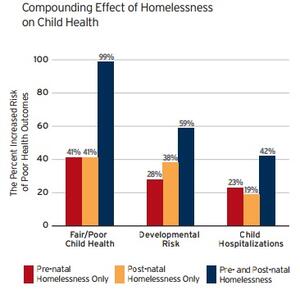
Even Prenatally, Homelessness Harms Children’s Health
- Title:
- Even Prenatally, Homelessness Harms Children’s Health
- Author:
-
Megan Sandel, Richard Sheward, Lisa Sturtevant
- Source:
- Publication Date:
-
2015
A large body of research shows that experiencing homelessness at a young age negatively impacts growth and development. The stress associated with homelessness can lead to permanent, negative changes in both mental and physical functioning in young children and can lead to chronic diseases later in life. New research from Children’s HealthWatch illustrates that homelessness has stronger lifetime effects for children who experience it at a younger age, and for children who are homeless for a longer period of time.
Major findings:
- Young children who experienced homelessness for longer than six months were significantly more likely to have developmental delays, fair or poor health, be overweight, and be hospitalized, than children who never experienced homelessness or did so for less than six months.
- While young children who experienced pre-natal or post-natal homelessness alone had increased negative health outcomes, those who experienced both pre- and post-natal homelessness had even more serious health consequences.
- Young children who experienced both pre- and post-natal homelessness were at an increased risk of having fair or poor health, experiencing developmental delays, and being hospitalized.
To prevent and end childhood and pre-natal homelessness, the researchers suggest policy interventions, including rapid re-housing and wraparound case management. As an example, they highlight a promising program in Boston called Healthy Start in Housing, which involves collaboration between the Boston Housing Authority and the Boston Public Health Commission.



